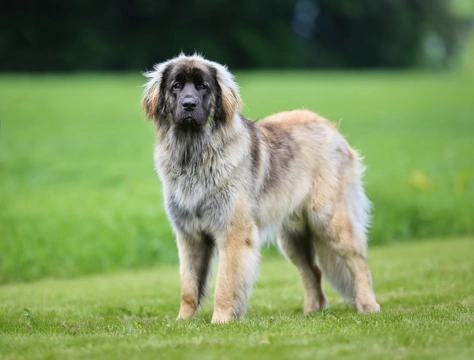
Leonberger Polyneuropathy (LPN1)
Leonberger polyneuropathy is a hereditary health condition that affects the Leonberger dog breed, and is actually a collection of diseases that affect the dog’s neuromuscular system.
The condition is progressive, with the first symptoms usually involving exercise intolerance and an abnormal gait, which usually begins in the back legs. Over time, the muscles of the back legs begin to atrophy, and a range of other symptoms including breathing problems, changes to their vocalisation sounds and further muscle wastage throughout the body of the dog can occur too.
If the disease progresses to its full extent, affected dogs may require laryngeal surgery to correct paralysis of the larynx (which affects breathing) as well as potentially being unable to stand up and move at all due to the associated muscle wastage. All of these symptoms occur due to degradation of the nerves, specifically the myelin sheaths that protect the nerve pathways and allow them to pass messages to the brain.
Two specific forms of Leonberger polyneuropathy have been identified within the breed, being LPN1 and LPN2 respectively. It is LPN1 or Leonberger Polyneuropathy 1 that we will look at within this article.
Because Leonberger polyneuropathy is a hereditary health condition within the Leonberger breed and cannot be caught or transmitted other than by means of inheritance, The Kennel Club oversees a testing scheme and results database for the condition, to allow Leonberger owners to have their dogs tested for the markers of the condition.
Knowing one’s own dog’s status and being able to research that of other dogs of the breed allows Leonberger breeders to make an informed decision about any mating match, in order to ensure that only healthy dogs of the breed that cannot pass the condition on to their offspring are used for breeding.
In this article, we will look at Leonberger polyneuropathy 1 in more detail, including how the heredity of the condition works, and how to get your dog tested. Read on to learn more.
More about Leonberger polyneuropathy
Leonberger polyneuropathy 1 is just one of several forms of polyneuropathy that can affect dogs, and this variant of the condition accounts for around 20% of all presentations of polyneuropathy cases in Leonbergers.
Polyneuropathy affects the nerves in different parts of the body by means of destruction of the myelin sheath, which protects the nerve pathways that send messages to and from the brain. When the myelin sheath breaks down, the functions of the nerves themselves become compromised, which leads to the signature symptoms of the condition.
The destruction of the nerves cannot be reversed or cured, and progressively worsens to the point that it can have a significant effect on the dog’s health and quality of life.
What sort of dogs can be affected by the condition?
As the name implies, Leonberger polyneuropathy 1 affects the Leonberger dog breed, although a laboratory in the USA have also identified the condition in a small number of dogs of the Saint Bernard dog breed too.
The Leonberger polyneuropathy test can also be used to identify the markers in other dog breeds like the Saint Bernard, but because UK populations of Saint Bernard dogs are not affected by the condition, the Leonberger is the only breed currently tested for the condition as standard.
Cross breed dogs with one Leonberger parent may potentially inherit the gene mutation for the condition too, but because the affected form of the condition requires faulty genes from both parents, cross breeds will not develop the condition due to inheritance from one parent only.
How does the heredity of the condition work?
Leonberger polyneuropathy 1 is an autosomal recessive hereditary health condition, which means that for a dog to inherit the condition, they must receive two copies of the mutated gene in a certain combination, one from each parent dog. Dogs are assigned a status for the condition being either clear, carrier or affected.
- Two clear dogs will produce clear puppies.
- Two affected dogs will produce affected puppies.
- Two carriers will produce a mixed litter of 50% carrier, 25% clear and 25% affected.
- A clear dog and a carrier will produce 50% clear and 50% carriers.
- A clear dog and an affected dog will produce a litter of carriers.
- A carrier and an affected dog will produce 50% carriers and 50% affected.
How to get your dog tested
In order to get your own Leonberger tested for the condition, you will need to take them along to the vet who will take a DNA sample from the dog in the form of a buccal swab or blood sample, which is then sent off to one of The Kennel Club’s approved laboratories for testing.
The results will then be returned to the owner, and a copy registered with The Kennel Club, who will enter it into the breed database where other Leonberger owners can search for the status of other dogs, in order to find an appropriate breeding match.



